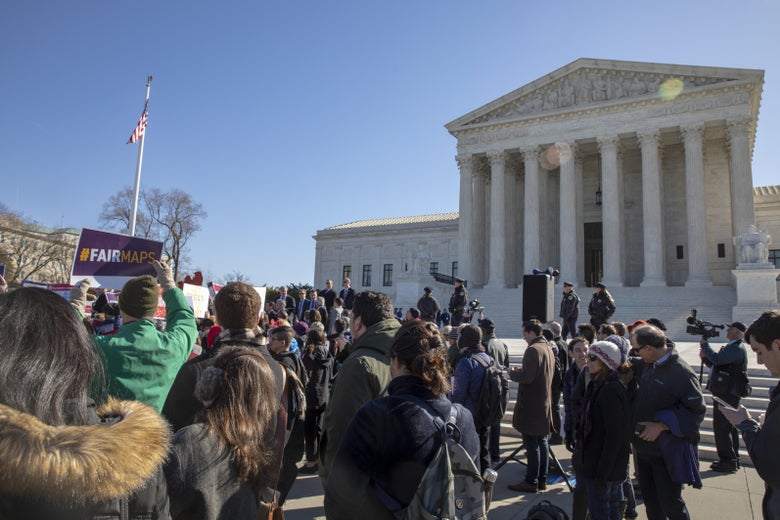
Protesters attends a rally for “Fair Maps” ahead of the Supreme Court hearings in landmark redistricting cases out of North Carolina and Maryland.
Tasos Katopodis/Getty Images
North Carolina’s congressional gerrymander is dead. A state court ruled on Monday that the map, which is skewed in Republicans’ favor, likely violates the North Carolina constitution and may not be used in the 2020 election. The only question now is how long Republicans hem, haw, and dawdle before conceding defeat and redrawing the illegal districts. Importantly, Republicans will not be permitted to stall past the election; the court made clear that it will delay the 2020 primaries to guarantee a lawful election.
Monday’s decision came from the same three-judge court that invalidated North Carolina’s gerrymander of the state legislature in September. Following that ruling, the plaintiffs—who are backed by Eric Holder’s National Democratic Redistricting Committee—filed suit against the state’s congressional map. The court found that this plan had the same infirmities as the legislative map: GOP legislators discriminated against Democratic voters, drawing maps behind closed doors with the aid of gerrymandering guru Thomas Hofeller. Their map “packed” most into a few deep-blue districts then “cracked” the rest throughout red districts. “I think electing Republicans is better than electing Democrats,” the legislator in charge of redistricting declared upon presenting the plan. “So I drew this map to help foster what I think is better for the country.”
The resulting plan created ten seats in the House of Representatives for Republicans and just 3 for Democrats, even when Democrats won roughly half of the statewide vote. This skewed map, the court ruled, ran afoul of the North Carolina constitution’s free elections clause by seeking to “dilute and devalue votes of some citizens compared to others.” It also infringed upon the state constitution’s equal protection clause, which protects citizens’ “right to vote on equal terms.” Finally, the partisan gerrymander violated the state constitution’s guarantee of free speech and assembly by “targeting certain disfavored speakers (e.g.
Democratic voters) because of disagreement with the views they express when they vote” and burdening “the associational rights of disfavored voters” by hindering their ability to elect representatives.
This is a remarkable turn of events. The U.S. Supreme Court refused to invalidate this exact same gerrymander less than four months ago in Rucho v. Common Cause. In doing so, though, the majority tossed the hot potato to state courts—and the North Carolina judiciary has shown that these courts are perfectly capable of redressing political redistricting. North Carolina’s litigation is a test case for the fight against partisan gerrymandering post-Rucho, and it has been a triumph for voting rights. North Carolina Republicans have not yet decided whether to appeal their most recent loss. They are slowly realizing that they are boxed in.
Still, there is a twist to Monday’s decision. The court granted a preliminary injunction, agreeing with the plaintiffs that the current congressional map is almost certainly unconstitutional. But it has not yet held hearings or a trial on the merits, so it is in no position to issue a final ruling that compels the legislature to redraw the maps. “This Court does not presume, at this early stage of litigation, to have any authority to compel the General Assembly to commence a process of enacting new Congressional districts,” it explained. Instead, the court “respectfully urges the General Assembly to adopt an expeditious process” of redistricting “that ensures full transparency and allows for bipartisan participation and consensus.”
The legislature has already shown that it can (sort of) do that. After the September ruling striking down the legislative gerrymander, North Carolina lawmakers redrew the maps to make them substantially fairer (if not perfectly nonpartisan).
The court approved those new maps on Monday. Redrawing congressional districts, however, may be more contentious. If Democrats continue to win about half the statewide vote under a fair map, they could win at least six of the state’s 13 congressional seats, three more than they have right now. Those three seats could grow Democrats’ majority in the House of Representatives in 2020—or, if it’s a close election, give Democrats control of the chamber.
Republicans in Washington may therefore urge North Carolina’s GOP lawmakers to dig in their heels and refuse to draw a fairer map.
But there is little doubt that, in the end, a new map will prevail. If Republican lawmakers do appeal Monday’s decision, the North Carolina Supreme Court’s Democratic majority will undoubtedly side with the plaintiffs. Lawmakers could also try to drag out proceedings in superior court. But the panel declared that it would delay the 2020 primaries if necessary.
Earlier this month, North Carolina Republicans attempted to delay the state court’s ruling by removing the case to federal court under the most laughable of pretexts. That maneuver failed. They are now running out of options; at most, they can hold up next year’s primaries, but the blame for this disruption will fall squarely on their shoulders. North Carolina’s judiciary continues to prove that, with a little courage and common sense, judges are well-equipped to safeguard every citizen’s right to cast an equal vote.
Support This Work
Help us cover the central question: “Who counts?” Your Slate Plus membership will fund our work on voting, immigration, gerrymandering, and more through 2020.
from Slate Magazine https://ift.tt/2pe31ne
via IFTTT
沒有留言:
張貼留言